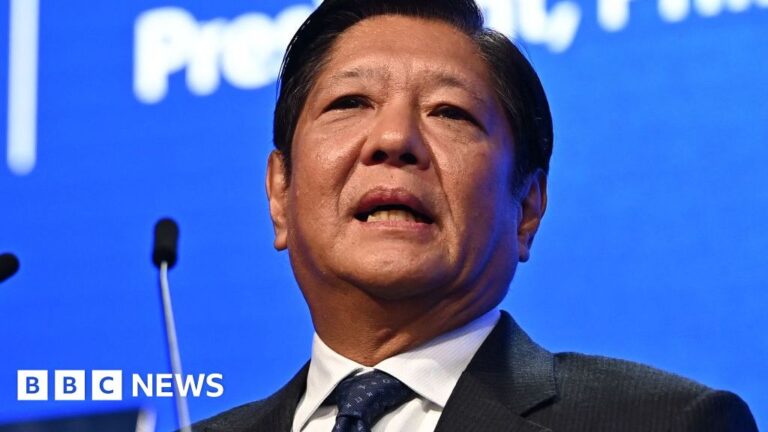Image source, Getty Images
- author, Tessa Wong
- role, BBC News
- Reported by Singapore
Philippine President Ferdinand Marcos Jr. has warned China not to cross red lines in the South China Sea, where tensions between the two countries continue to escalate.
He said if Filipinos were killed as a result of deliberate Chinese actions, the Philippines would consider it akin to an “act of war” and respond accordingly.
Marcos was speaking at a security forum in Singapore attended by defense chiefs from around the world, including the United States and China.
In response, a Chinese military spokesman accused the Philippines of “shifting the blame onto China” and engaging in “slander and attack”.
In recent months, a long-running dispute between China and the Philippines over territory in the South China Sea has escalated into violent clashes.
Manila has loudly protested after Chinese patrol boats fired water cannons at Philippine ships and supply vessels.
China says it is defending its sovereignty. Earlier on Friday, a Chinese military spokesman accused the Philippines of “provocative actions”.
Observers worry that any escalation could spark conflict in the South China Sea between China and the United States, which is obligated under a treaty with the Philippines to defend the Southeast Asian nation if attacked.
The United States has previously said it remains “unwavering” in its commitments to its allies in the region and has sought to strengthen ties with them, including holding summits with the Philippines and Japan last month.
On Friday, shortly after President Marcos finished his opening speech at the Shangri-La Dialogue in Singapore, a delegate presented a hypothetical situation in which a Chinese water cannon had killed a Filipino soldier. The president was asked whether he considered this a red line and whether it violated the Philippine-U.S. Treaty.
“If a deliberate act results in the death of a Filipino, not just a military member but even a Filipino citizen, I believe that comes very close to what we would define as an act of war, and therefore we will respond accordingly. And I believe that our treaty partners are held to the same standard.”
“When we get to that stage, we have definitely crossed the Rubicon. Is this a red line? It is almost certainly a red line,” he said, noting that recent clashes have injured Filipinos but no one has been killed yet.
Image source, Getty Images
In response to a BBC question, a Chinese spokesman said: “If just one person is killed accidentally in a conflict or accident that leads to war, I would say that the country is indeed a warlike country.”
The Marcos government has boosted military spending, buying missiles from the United States and India, and is seeking to win a larger share of U.S. military aid packages for its allies in the Indo-Pacific region.
The issue also came up during a key meeting between U.S. Defense Secretary Lloyd Austin and his Chinese counterpart Dong Jun early on Friday.
China’s military said the Philippines was “emboldened and supported by external forces” and was “breaking its commitments and engaging in provocative acts” over the disputed Second Thomas Shoal, where Manila has set up a military outpost.
They also opposed the US deployment of a medium-range missile system to the Philippines during recent joint military exercises, saying it “poses a real threat to regional security.”
But both the United States and China have also signaled they are keen to keep the lines of communication open.
A U.S. statement on the talks said they were working to resume calls between military commanders – a vital line of communication that was cut off after then-House Speaker Nancy Pelosi visited Taiwan in 2022 – and to set up a crisis communications working group.
Wu told reporters the meeting had been “positive, pragmatic and constructive,” adding that U.S.-China relations were “stabilizing from further deterioration.”

